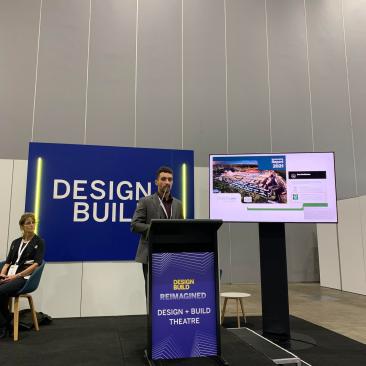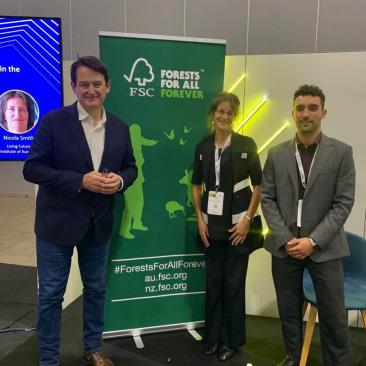Our panel included Luca Brown, a civil engineer from Timberlink Australia who specialises in timber structures and off-site construction methods, and Nicola Smith who is the Technical Officer with the Living Future Institute of Australia (LFIA) who focuses on healthy materials and the Declare transparency program and providing technical advice on the Living Building Challenge.

Kicking off the session, Luca explored the topic of how we value the materials we use in construction projects. He highlighted the incredible capabilities of the natural resource that is responsibly managed timber and drew particular attention to the role that this has in reaching global targets for a regenerated environment. Luca spoke about the importance of FSC certification in construction, stating that,
“Extracting value from our resource is meaningless if we don’t have integrity and certification from the likes of FSC to allow us to ensure that everything we utilize in the end product is not doing more harm than good. This isn’t just on an environmental level, but also on a social level.”
Luca’s presentation inspired us to think about how the construction industry has a fantastic opportunity to maximise the value of FSC-certified responsibly sourced timber and that there is serious potential to drive positive change in this area.
Nicola Smith’s presentation highlighted that the Living Future Institute of Australia (LFIA), the Australian affiliate of the International Living Future Institute (ILFI), and FSC are aligned in their holistic approach to regenerative design. The LFIA is revolutionising the built environment by catalysing the transformation towards communities that are socially just, culturally rich and ecologically restorative, through programs such as the Declare ® products transparency platform and Living Building Challenge ® (LBC) rating tool. Emphasising FSC’s robust and transparent supply chain integrity, Nicola spoke about how FSC-certified timber falls under the LBC Materials Petal imperatives “Responsible Materials” and “Responsible Sourcing", which requires 80% of all timber used in a project to be FSC-certified or salvaged, and encourages adoption of third-party certified standards for fair labor practices and sustainable resource extraction of rock, metal, minerals, and timber. Her presentation emphasised that human and environmental health considerations have emerged as crucial factors in product manufacturing, materials selection and the circular economy more broadly, and that FSC-certified timber has an important role to play in meeting these needs. Materials transparency and specifiers asking the right questions to increase demand are key to shifting the supply chain and achieving responsible sourcing outcomes.

The Design Build Expo was a fantastic opportunity to get out into the community and explore some important topics around innovation and integrity in the supply chain. We thank our host Jon Dee, and panel members, along with everyone who was able to attend the session for participating in these insightful discussions.
